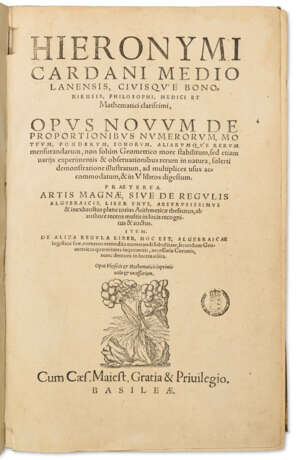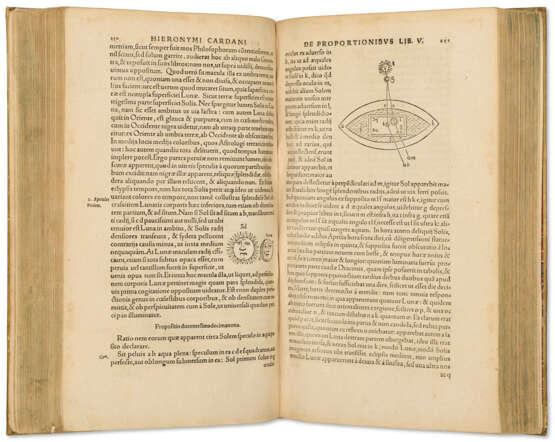ID 1129626
Lot 8 | Opus Novum de proportionibus numerorum
Estimate value
$ 3 000 – 5 000
First edition of the Opus novem, with the revised second edition of the Ars Magna, of Cardano, the maverick mathematician, physician, and astrologer. This publication comprises Cardano's most important scientific works. The Opus novum is his principal work on mathematical mechanics, and was the first significant work to examine mechanics from a largely mathematical basis. The Ars Magna, first published in 1545, contains the famous solution, first discovered by Tartaglia, to cubic equations. Together with the third work in this volume, the De aliza regula (only added to the text in this edition), it is the most important work of advanced mathematics published in the sixteenth century.
"Although in some cases he used imaginary numbers, overcoming the reluctance of contemporary mathematicians to use them, it was only in 1570 that [Cardano] added a section entitled “De azila regula”... devoted to the ‘irreducible case’ of cubic equations, in which Cardano’s rule is extended to imaginary numbers. This was a recondite work that did not give solutions to the irreducible case, but it was still important for the algebraic transformations which it employed and for the presentation of the solutions of at least three important problems" (DSB). Adams C-689; Smith Rara 338f; Riccardi I 256 9.
Three parts in one, folio (300 x 192mm). Woodcut printer's devices on title and last page, woodcut diagrams in text (some light toning, title reinserted, some faint dampstaining). 18th-century vellum (rebacked in the 19th-century with original spine panel laid down but new marbled endleaves and spine labels). Provenance: Königliche Handbibliothek (small 19th-century stamp on title).
| Address of auction |
CHRISTIE'S 20 Rockefeller Plaza 10020 New York USA | ||||||||||||||
|---|---|---|---|---|---|---|---|---|---|---|---|---|---|---|---|
| Preview |
| ||||||||||||||
| Phone | +1 212 636 2000 | ||||||||||||||
| Fax | +1 212 636 4930 | ||||||||||||||
| Conditions of purchase | Conditions of purchase | ||||||||||||||
| Shipping |
Postal service Courier service pickup by yourself | ||||||||||||||
| Payment methods |
Wire Transfer | ||||||||||||||
| Business hours | Business hours
|




